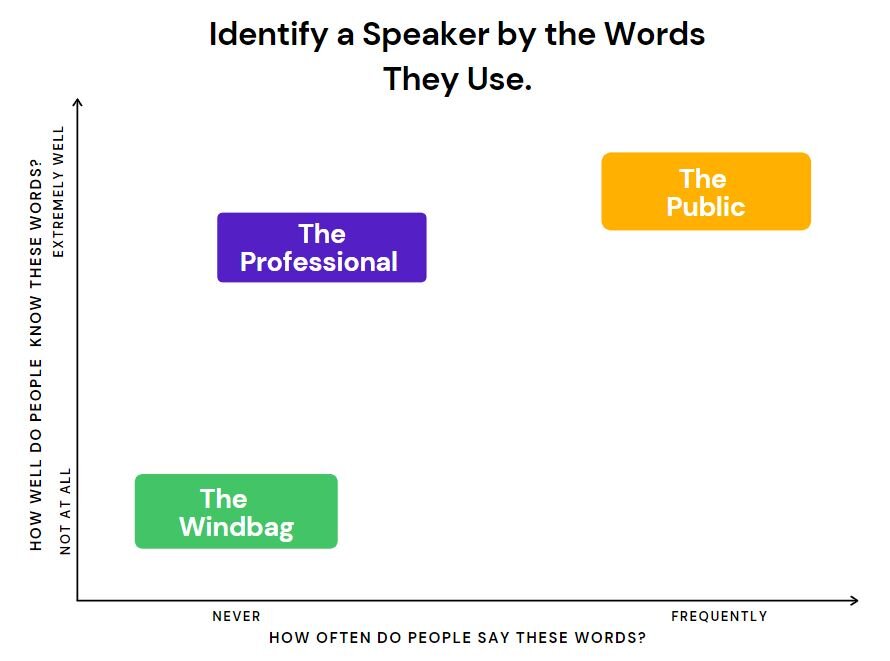The words we use matter. From a very young age, we are taught that the words we use with our parents are not the ones we use with our peers. In our school days, our vocabulary on a playground basketball court differs greatly from the one we display in the classroom. In adulthood, we know that our happy hour conversations probably don’t belong in the workplace
As we age our vocabulary grows, and we develop our “social survival skills” in a larger variety of settings and with different types of audiences. It has become clear to me, however, that there are still plenty of people that could use a bit of fine-tuning when it comes to their choice of words. I am not talking about inappropriate topics or offensive words. I am specifically talking about professionals and the way they unwittingly position themselves in the eyes and ears of their clients.
I will begin with this simple visual aid:

Using just two criteria as our guides, we can discern three types of speakers by the words they choose:
-
The Public - This one is pretty straightforward. By definition, The Public’s vocabulary is made of words that most people know well and use frequently.
-
The Windbag - This person attempts to use their word selection to elevate themselves to a dominant position in the conversation. You may remember The Windbag from this previous essay that mentions someone who wants to intimidate and communicate their own importance to you. The vocabulary of The Windbag exists for the same reasons. It may have the added effects of confusing you or making you feel intellectually inferior. These feelings are not accidental. The Windbag may very well have looked up that obscure term they dropped that very morning. They know that almost nobody knows the meaning of that word, and they hope you think they’re smarter than you. Don’t fall for it. All they have actually done is demonstrate their insecurity and general ridiculousness.
-
The Professional - In my chosen industry of investments and finance, some degree of “jargon” may be unavoidable. The Professional will do their best to minimize their use of such terms. Their goal is the opposite of confusion and intimidation, but rather clear understanding and comfort for the listener. Many of the words they use may be words that the public very rarely uses in everyday life, but they will likely be familiar to most people. When it is absolutely necessary to use a potentially confusing term, the professional will either provide enough context to make the meaning clear or simply pause to define it. You will recognize The Professional by their simple language, easy engaging pace, and clear concern for your understanding of key topics.
Just like industry jargon, to some extent, the windbags of the world are unavoidable. From time to time, you may find yourself in the presence of someone who is trying to use confusing terminology as a weapon. It is OK to give them a chance to slow down and offer some clarity. You are also well within your rights to end the conversation with the windbag and seek out a true professional.
I conclude with some words of wisdom from a man widely regarded as the father of American literature.
“Don't use a five-dollar word when a fifty-cent word will do.”― Mark Twain
Related: Have We Forgotten How to Admire?


